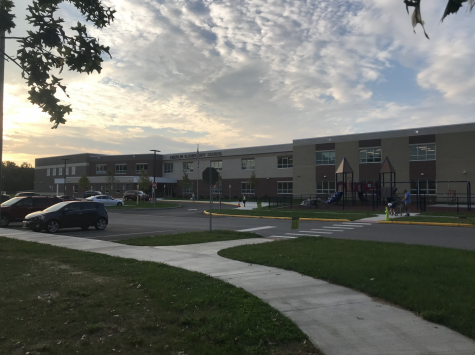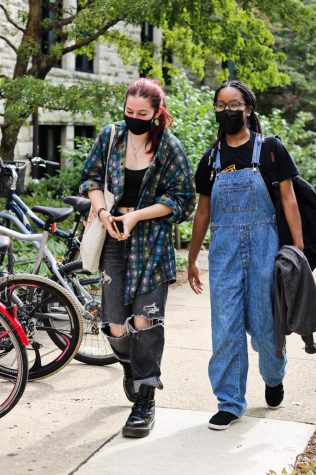Amid Travel Restrictions, 139 International Students Study Remotely
Many international students have been unable to travel to the U.S. to continue their education on Oberlin’s campus this fall. Of the 317 people with F-1 student visas enrolled in the fall semester, 139 are studying remotely. For international students who stayed in the country through the break — or who were able to return to the U.S. this semester — rapidly changing federal guidance in the past few months prompted much uncertainty about their ability to attend Oberlin this fall.
The U.S. Immigration and Customs Enforcement initially announced restrictive F-1 policies on July 6 that forbade international students who were taking only online classes from staying in the U.S. Following backlash, ICE later rescinded these policies and presently, returning F-1 students can maintain their immigration statuses while taking fully online courses. However, other barriers are still keeping students from arriving on campus, according to Assistant Dean of Students and International Student Resource Center Director Josh Whitson.
“Due to the unpredictable nature of the pandemic, it’s hard to determine exactly when travel restrictions will be lifted or embassies will resume normal operations,” Whitson wrote in an email to the Review. “Many students have had flights canceled or previously scheduled visa appointments delayed. We are working with students individually to review options and make sure they are being supported during these challenging times.”
Although the College has instituted a three-semester plan, international students are expected to enroll in the fall and spring semesters regardless of their class year in order to maintain their immigration status. International students who cannot return to Oberlin can enroll in a remote fall semester or wait for the spring and summer semesters, when they may have a better chance of traveling to Oberlin. Twenty-three returning F-1 students chose to take a leave of absence this fall.
Of the 101 new F-1 students, only 22 have arrived on campus for in-person classes this fall and 47 are enrolled for remote courses. Nineteen F-1 first-years deferred to the spring semester, and one student deferred until fall 2021.
If the students who have taken a leave of absence or deferral enroll in either the spring or summer semester, the total F-1 enrollment for the 2020-2021 academic year will be 360 students. This is consistent with the College’s pattern of F-1 enrollment in the last several years.
However, the ability to attend Oberlin this year hasn’t always been clear to international students.
Before the July ICE policy forbidding online international students from staying in the U.S. was revoked, Whitson and others worked to interpret how the policy would affect Oberlin students.
According to Whitson, it was unclear whether on-campus international students would have been able to remain in the country after Nov. 25, when Oberlin students are scheduled to finish the fall semester remotely. This federal guidance was rescinded following the threat of several lawsuits.
At the time, the College responded quickly to the new policy, making plans for possible in-person courses for international students after Nov. 25 to ensure that they could maintain their immigration status.
“From the beginning, our focus has been on supporting our international students, and all of our students,” Dean of the Conservatory William Quillen wrote in an email to the Review. “We were actively exploring options to help our international students complete their course of study no matter what circumstances might have come their way.”
The current federal protocol allows returning students holding F-1 visas to take online courses while maintaining their immigration status. New F-1 visa students, however — including first-year or transfer international students — are not permitted to study online in the U.S. as of a July 24 statement from ICE. ICE has clarified that new students will be able to maintain their immigration status if their in-person classes switch to a remote program during the school year, so this policy should not impact Oberlin students.
Whitson explained that the College has been monitoring the evolving federal announcements closely to ensure that international students are able to maintain their statuses.
“We are committed to making sure our F-1 students maintain their immigration status and will continue to monitor the situation and adjust plans accordingly when needed,” Whitson wrote in an email to the Review.
Although the current guidance allows for far more flexibility in the face of the COVID-19 pandemic, a certain degree of uncertainty remains about changes in immigration restrictions down the road. The Trump administration cannot immediately change immigration policy; however, it can loosen restrictions on existing policies, as it did in March, and then reinstate previous restrictions, which it tried to do in July.
Nonetheless, Whitson is confident that, thanks to the College’s vigilance and precautionary measures, any future changes won’t prove to be major obstacles for international students.
“When it comes to advising our F-1 students on their immigration status I always take the approach of assuming the government will not grant exceptions,” Whitson wrote. “So while we were hoping it would not be the case, I made sure students that would have needed to be remote or were considering a gap semester were aware of the necessary immigration steps. With the July 6 temporary final rule being rescinded and the clarification released on July 24, students that were prepared to temporarily have an inactive immigration status while outside of the US thankfully no longer have that concern under the current guidance.”







